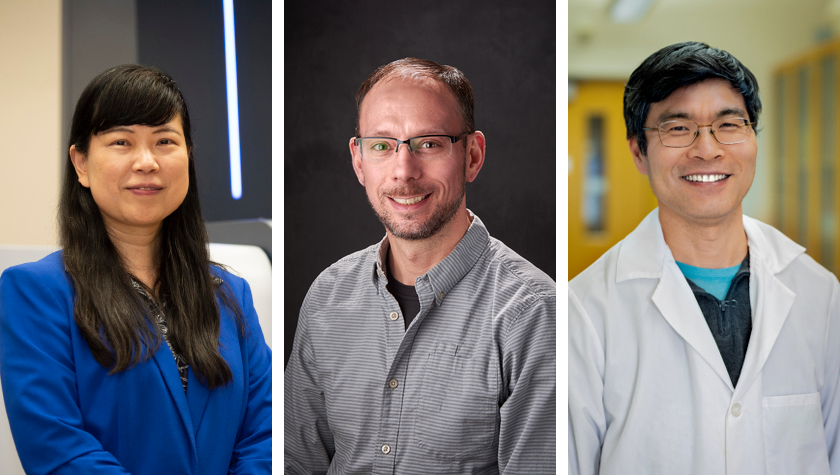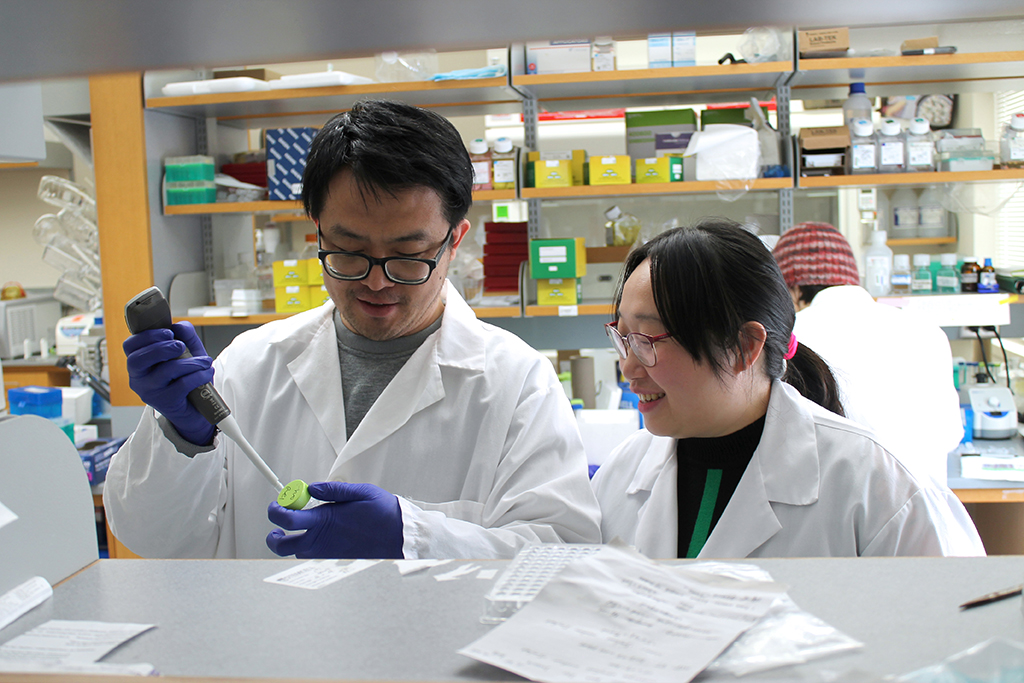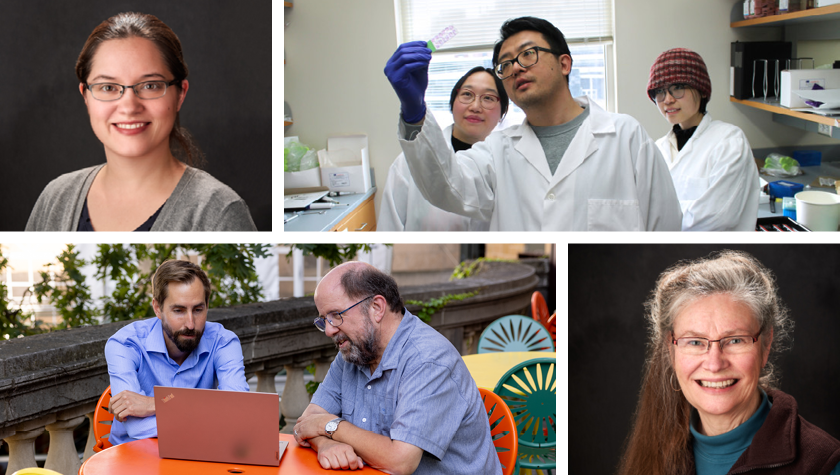
The School of Pharmacy is cultivating impactful interdisciplinary partnerships across campus and beyond
By Archer Parquette
From local nursing homes to global health, the University of Wisconsin–Madison School of Pharmacy is breaking barriers through innovative research partnerships.
The School’s five-year strategic plan, established in 2020, includes a commitment to grow interdisciplinary and translational research, all in support of the Wisconsin Idea: to transform lives beyond the classroom. This effort has spurred projects reaching across disciplines to tackle colorectal cancer, the opioid crisis, HIV prevention in Africa, and more, creating real, measurable impacts on patient care and health outcomes.
“What has been exciting since we put the strategic plan in place is to see how much growth there has been and how many connections the School has made,” says Professor Mel de Villiers, vice dean and chair of the School’s Academic Planning Council.
“We’re seeing how deeply the School of Pharmacy is embedded in the university, in the community, in the state, and nationally.”
—Mel de Villiers
To fuel that growth, faculty are spearheading interdisciplinary collaborations, creating and expanding local and regional partnerships, and delving into precision medicine.
“We’re seeing how deeply the School of Pharmacy is embedded in the university, in the community, in the state, and nationally,” says de Villiers, who is also associate dean for academic affairs. “We’re not an island — our researchers and faculty are connected so widely and doing such great work.”
Interdisciplinary partnerships
As medication experts who work alongside physicians, nurses, and other healthcare providers, pharmacists are inherent educators and collaborators. Several ongoing projects at the School of Pharmacy harness the interdisciplinary nature of pharmacy work to reach across health professions to improve patient outcomes.
One such project dates back to 2011, when Professor of Social and Administrative Sciences Betty Chewning and Professor of Pharmacy Practice Beth Martin (BS ’90, MS ’03, PhD ’06) teamed up to help older adults who don’t fully understand their prescriptions.
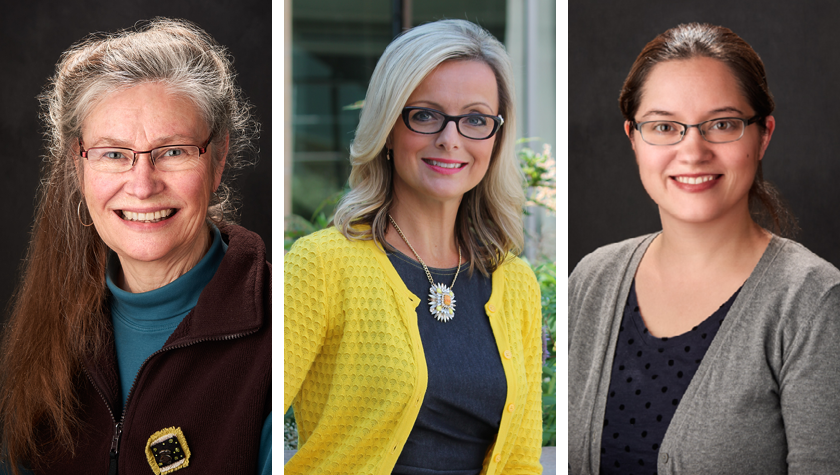
“In the School of Pharmacy, we all work to help our students develop excellent communication skills — and we realized that it would be very helpful if patients also have equally good communication skills,” Chewing says. “Sometimes patients underestimate what they can accomplish in partnership with their pharmacist.”
The two — along with Associate Professor of Pharmacy Practice Amanda Margolis (PharmD ’09, MS ’17), a research assistant at the time — created a solution: Med Wise RxTM. It’s a community-based educational workshop, implemented in 14 Wisconsin counties and agencies, directed at older adults taking multiple medications, helping them avoid life-threatening medication errors by more effectively communicating with their pharmacists and other health care professionals.
Martin and Margolis brought their expertise in pharmacy to the project, while Chewning shared her understanding of the social aspects that are crucial for an effective educational program for older adults.
“Each of us bring in what we uniquely can offer, and in the process, something happens that would not have happened if we were missing one of the three of us,” says Chewning. “The value of interdepartmental, interprofessional collaboration can’t be underestimated. It’s amazing what can be done.”
Now, more than a decade later, the trio has received a Dissemination and Implementation Grant from the UW Institute for Clinical and Translational Research to expand the Med Wise RxTM program into a virtual format.
“The value of interdepartmental, interprofessional collaboration can’t be underestimated. It’s amazing what can be done.”
—Betty Chewning
“This is an interdisciplinary team, but it isn’t just us as faculty that have made it a success,” Martin says. “We have utilized student pharmacists to interview program participants, our stakeholder group to inform and react to program ideas, our community partners to recruit participants and teach the program, and more. The collaborations really go beyond the university.”
Similarly, the School’s pharmaceutical sciences faculty are reaching across fields to accelerate research. For their highly innovative and groundbreaking multidisciplinary research, three faculty have received 2024 Research Forward awards: Professor Weiping Tang, to partner with the chemistry and computer science departments to create a deep learning platform that designs molecular glues to stabilize protein-protein interactions; Professor Tim Bugni, to collaborate with the School of Medicine and Public Health (SMPH) to explore host-pathogen interactions to create a new paradigm for infectious disease treatment; and Professor Lingjun Li, to work with SMPH to broaden the understanding of the pancreatic islet microenvironment to improve diabetes outcomes.
“Each of these projects is important,” says de Villiers. “I’m excited by all the potential for them to continue to grow and expand and become really monumental.”
Local and regional collaborations
The School of Pharmacy’s collaborations don’t stop at campus borders; the School is extending its expertise to regional and even global partners.
“The purpose of the whole university is to better society, isn’t it?” says de Villiers. “As part of the strategic plan, we really wanted to increase our regional and local partners to show people what pharmacy can do to impact patient care around the region.”
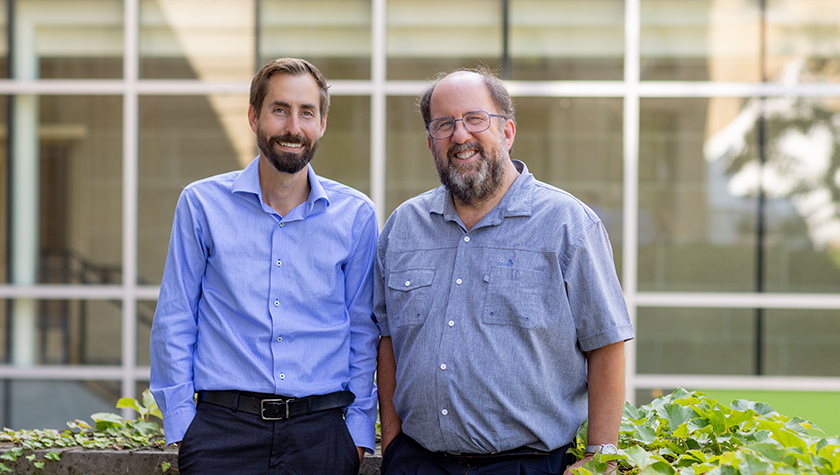
One of these partnerships connects Wisconsin and Minnesota to improve antibiotic prescription tracking in nursing homes. In a Centers for Disease Control and Prevention-funded project, Jay Ford, an associate professor in the School’s Social and Administrative Sciences Division, and Christopher Crnich, a professor in the Infectious Disease division of the School of Medicine and Public Health, turned to the Minnesota Department of Health (MDH) for help. The MDH had developed an infection and antibiotic use tracking tool for use in nursing homes, and our team thought it could be tweaked to meet Wisconsin’s needs.
Ford and Crnich, in collaboration and with permission from the Minnesota team, have been adapting their tool to help nursing homes track and reduce unnecessary antibiotic use, preventing dangerous side effects like antibiotic resistance and ensuring safer care for vulnerable residents. They’ve also prepared educational programs and materials for nursing home staff to teach them to use the tool. The rollout is set for January 2025.
“It’s been a great partnership,” says Ford. “I’ve worked with Dr. Crnich for over 10 years on multiple projects. Our partners in the Wisconsin Department of Health Services are very vested in this and provide us with valuable resources and ideas, and the folks at the Minnesota Department of Health couldn’t have been nicer. If we can reduce antibiotic adverse reactions in nursing homes, then we’re making care better for residents and staff.”
Ford is also a key player in another major project that is expanding the School’s partnerships with the Pharmacy Society of Wisconsin (PSW). He and Cody Wenthur, associate professor in the School’s Pharmacy Practice and Translational Research Division, are launching the Wisconsin Opioid Overdose Response Center (WOORC), a pharmacy-focused, federally-funded center to combat the opioid crisis in the region. As a founding partner, PSW will help support WOORC’s communication and educational efforts to reach pharmacists across the state.
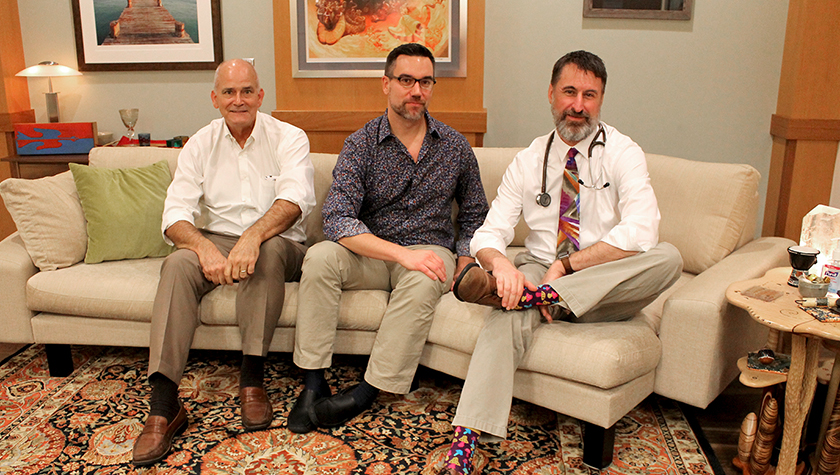
Another collaboration with PSW, PearlRx, recently became the largest pharmacy practice-based research network in the country. Founded in 2013 by the School, the network now has 945 pharmacist members across 59 Wisconsin counties, facilitating projects to improve pharmacy practice and patient care.
Since the strategic plan was set in 2020, the School has also launched the Transdisciplinary Center for Research in Psychoactive Substances, which has cultivated campus collaborators from the Department of Anesthesiology, School of Human Ecology, Department of Psychiatry, and more, as well as local partnerships with the Heffter Research Institute, Revive Therapeutics, and the Usona Institute.
The School is even making partnerships globally. In 2023, the School started a partnership with MATRIX, a five-year program funded by the United States Agency for International Development to create online drug development courses for scholars in Africa.
“This project really strikes a chord with me because it’s part of the Wisconsin Idea, on a global scale,” says Professor Eric Buxton, chair of the School’s Division of Pharmacy Professional Development, who leads the partnership. “We are hopefully going to help these scholars develop new HIV prophylactics and therapeutics and help quality of life in Africa and the rest of the world.”
Cutting-edge center of research
Colorectal cancer is the second-most common cancer in the United States — and the third leading cause of cancer-linked death. Ting Fu, an assistant professor of pharmaceutical sciences, is researching ways to bring that number down. Her research focuses on bile acids, which can either promote or inhibit the development of cancer cells depending on several factors.
“We want to identify and understand these biomarkers at the different stages of colon cancer development,” says Fu. “We can use that to identify therapeutic leads and potentially to create more effective and safe targeted therapies.”
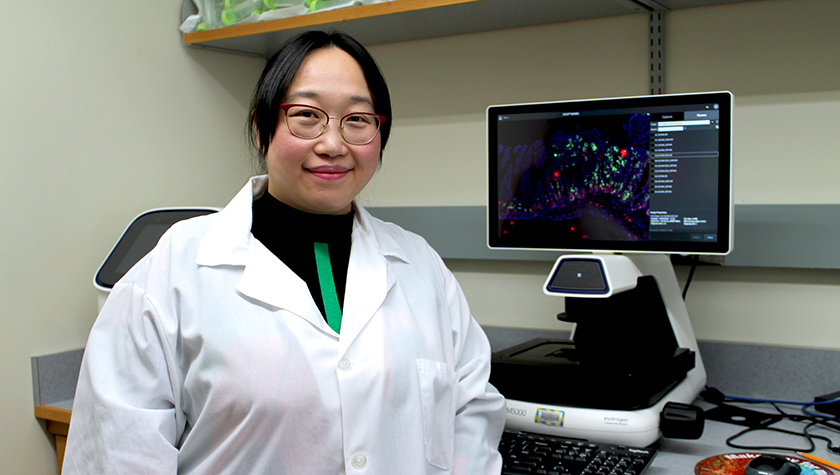
Fu’s research, ultimately geared toward reducing cancer mortality, is advanced through her work as an affiliate member with the UW Center for Human Genomics and Precision Medicine, where she can collaborate with oncologists, geneticists, physicians, biomolecular chemists, and more.
“I believe the Center for Human Genomics and Precision Medicine will become world famous,” de Villiers says. “There is an intersection between precision medicine and pharmacogenomics, which is what we at the School know best, and we want to contribute to that.”
With the strategic plan nearing its five-year mark and many of its goals accomplished, de Villiers believes that the School of Pharmacy has laid the groundwork for even more fruitful collaborations in the years ahead.
“Ultimately, this means we can do more,” says de Villiers. “We can advance more science. We can help more patients. And that’s incredibly exciting.”
